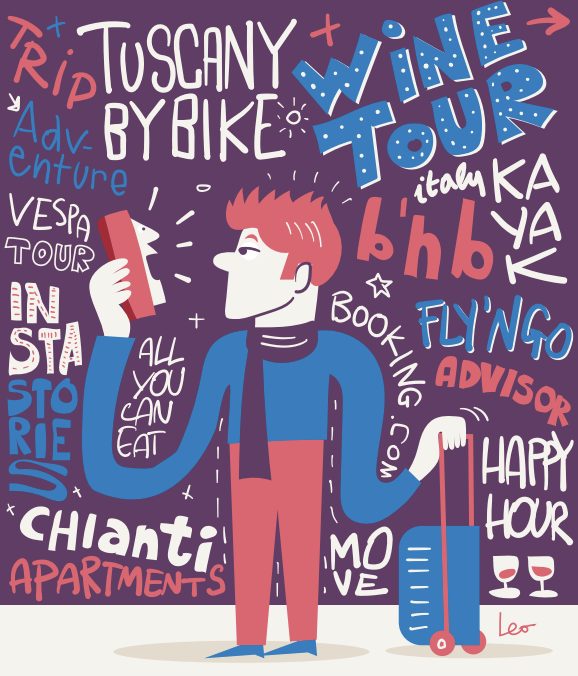Two letters are on (almost) everyone’s lips. Uttered with awe, AI was Collins Word of the Year for 2023 as lexicographers remarked that use of the term had “accelerated” to become the dominant topic of conversation. Market research platform Market.US claims that the global generative AI market is currently worth 13 billion US dollars and it is expected to exceed 22 billion by 2025. Virtual assistants, online travel agencies and an overhauled user experience are already beginning to change the way in which we book and experience our holidays. Behind the scenes, generative AI will allow travel professionals to customize their processes, improve interactions and analyze future trends before they happen. The topic dominated discussions at BTO (Be Travel Onlife), Italy’s foremost event on digital tourism, innovation and training established in 2008, which was held at Florence’s Stazione Leopolda last November. Stimulating talks sparked debates about the utility of chatbots aimed at assisting guests, the impact that robots have on the customer experience and how AI can help HR management in the travel industry.

“ChatGPT and the latest integrations imply that the future of online distribution is here, and that hotels can benefit from it,” writes Mirko Lalli, founder and CEO of The Data Appeal Company and Travel Appeal in a blog post. “Imagine you’re looking for the right hotel for your next vacation. Instead of browsing countless websites, comparing rates and amenities, you ask an AI chatbot for help. After a short exchange, you get a list of the best hotels personalized to your needs in the destination of your choice. This is no longer a dream, but a reality due to the introduction of ChatGPT and other chatbots based on Large Language Models (LLM).”
Chatbots are something that global hotel group Marriott has already put into practice. “AI offers very interesting opportunities,” comments Fernando Pane, general manager of Sina Villa Medici, Autograph Collection, which is part of Marriott Hotels & Resorts. “At present, we are approaching this innovation by exploring the benefits, making use of the research that Marriott is conducting thoroughly at an international level. At the moment, the introductions are minimal, simply as replies to the chats that guests open before, during and after their stay.”
Established in 1994 by a group of Florentine hoteliers, Consorzio Firenze Albergo is striving to get ahead of the AI curve through an innovative collaboration with a Rome-based technological partner. “Considerable importance will be given to virtual assistants like Google, Siri and Alexa, which is why we are proud to announce a new partnership with Aetherna for the virtual assistant Alexa Smart Properties Hospitality, something brand-new on the Italian market, which will make guests feel at home in Italian and English wherever they are,” comments Hana Prochazkova, on behalf of Consorzio Firenze Albergo.
Lalli goes on to explain how Microsoft recently announced the beta version of their new Bing search engine, complete with all ChatGPT functionalities, which means that before too long travellers will be able to receive a travel itinerary directly on their screens. He also cites Trip.com’s recent introduction of TripGen, a chatbot that provides users with tailor-made travel itineraries that can be booked directly in real time on the platform. “Understanding the consumer’s frictions when planning and preparing for a trip, TripGen has integrated AI technology to resolve a potentially complex and stressful process,” writes Lalli.
This deeper use of AI is being evaluated by one of Florence’s most successful hospitality brands. Lungarno Collection, which comprises the Ferragamo-owned five-star Hotel Lungarno, four-star Hotel Continentale and Gallery Hotel Art, all in Florence, as well as the five-star luxury Portrait establishments in Florence, Rome and Milan, is testing AI chatbot solutions to harness the technology in order to communicate with clients through touchpoints like their website. “In actual fact, we are testing Google’s AI potential to manage PPC [Pay Per Click] campaigns,” remarks CEO Valeriano Antonioli. “Likewise, our Revenue Management System contains an AI component for dynamic price management. At the same time, we are also testing the AI potential of OTA [Online Travel Agencies] for the automatic ordering of photos of our hotels. All this is aimed at increasing conversions.”
Upping the conversion rate lies at the core of how AI can potentially benefit the hotel industry, but it will involve a sea change. Up until now—and for the foreseeable future until other payment-based methods become mainstream—SEO (Search Engine Optimization) and SERP (Search Engine Results Pages) have been fundamental in securing bookings for hotels. Launches such as TripGen pose the question of whether OTAs and traditional search engines like Google could soon be replaced by conversational online travel agencies (COTA), hence changing the way we search for information and transforming how hotels distribute their availability and sell their rooms. In the meantime, the hotel industry continues to work on its online presence, furnishing quality contents and offers that meet customer expectations. “The more targeted and clearer the content, the more it will be used to train LLMs and improve their ability to meet the requests of users,” comments Lalli.
Prochazkova confirms the sentiment. “Artificial Intelligence will probably become the main player in the initial stages of travelling, in choosing a destination and hotel. Our job will be to feed this with more detailed and enticing information. Marketing and SEO activities will become even more important in obtaining a better positioning within search engines. The human element will nevertheless remain fundamental in feeding AI and welcoming guests in person, accompanying their stay with the quality that we are renowned for.”
At luxury hotels Villa San Michele in Fiesole and Castello di Casole near Siena, the Belmond group is retaining the flawless human touch for which it is renowned. The only exception is on the communications side, which incorporates an AI system to gather press coverage of its hotels. “Signal is the platform we use to do this,” says Sophie Fabiani, communications manager for Villa San Michele and Castello di Casole. “The more we use it, the more it learns.”
While AI brings myriad possibilities and enticing technological solutions such as chatbots, QR code room keys and online check-in, welcoming smiles, the human touch and personal reassurance will remain at the very heart of the hotel industry in Florence and further afield. After all, people make places, and human interaction is why we travel in the first place.








